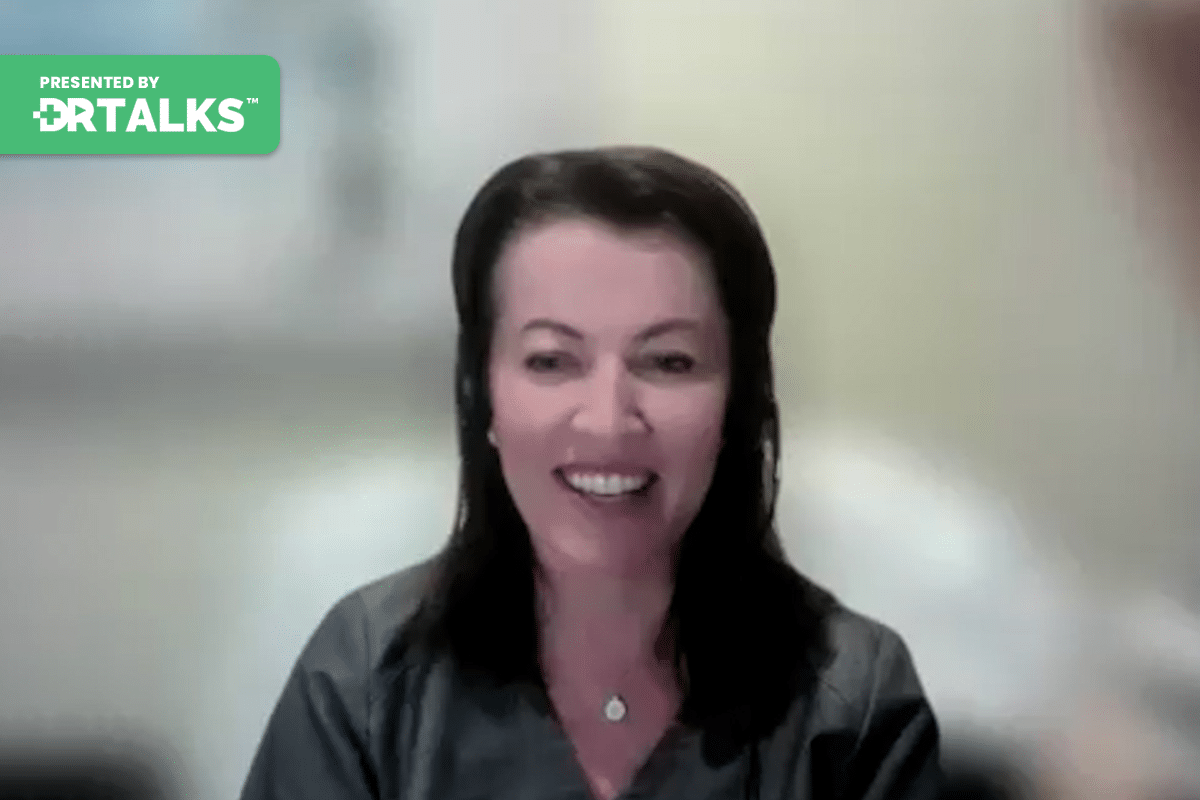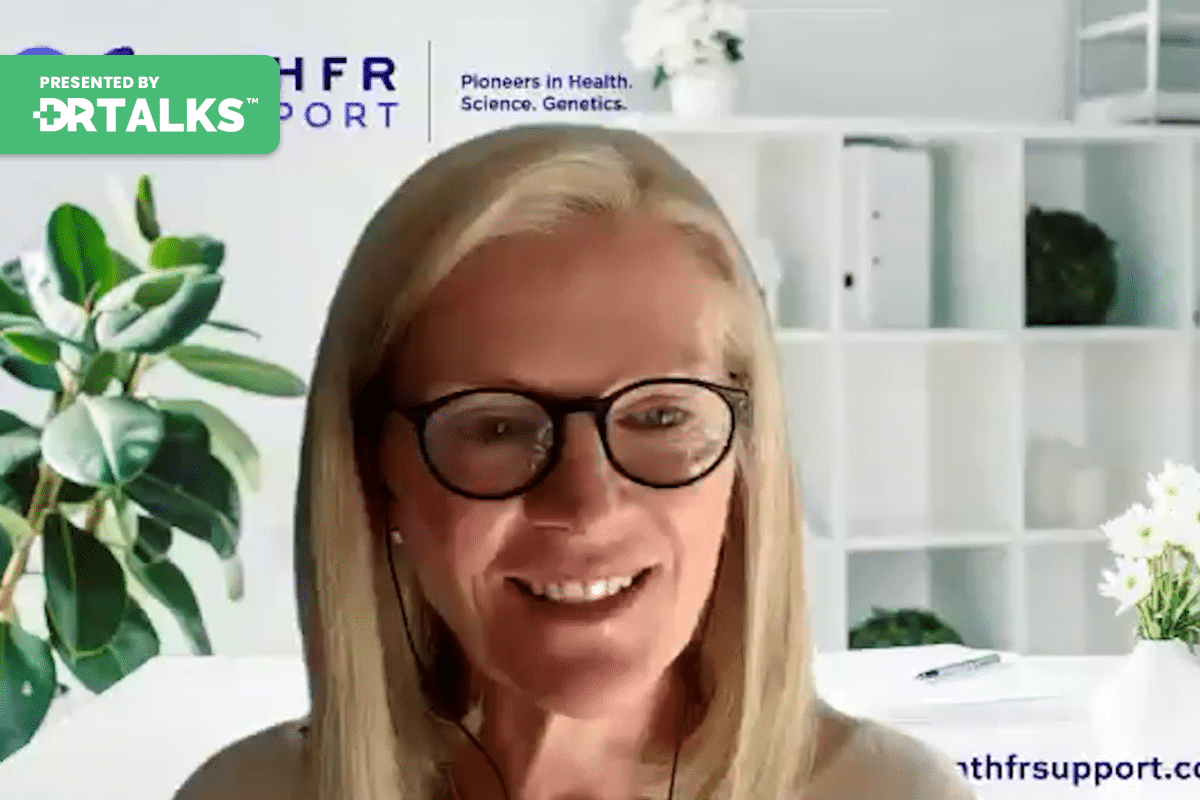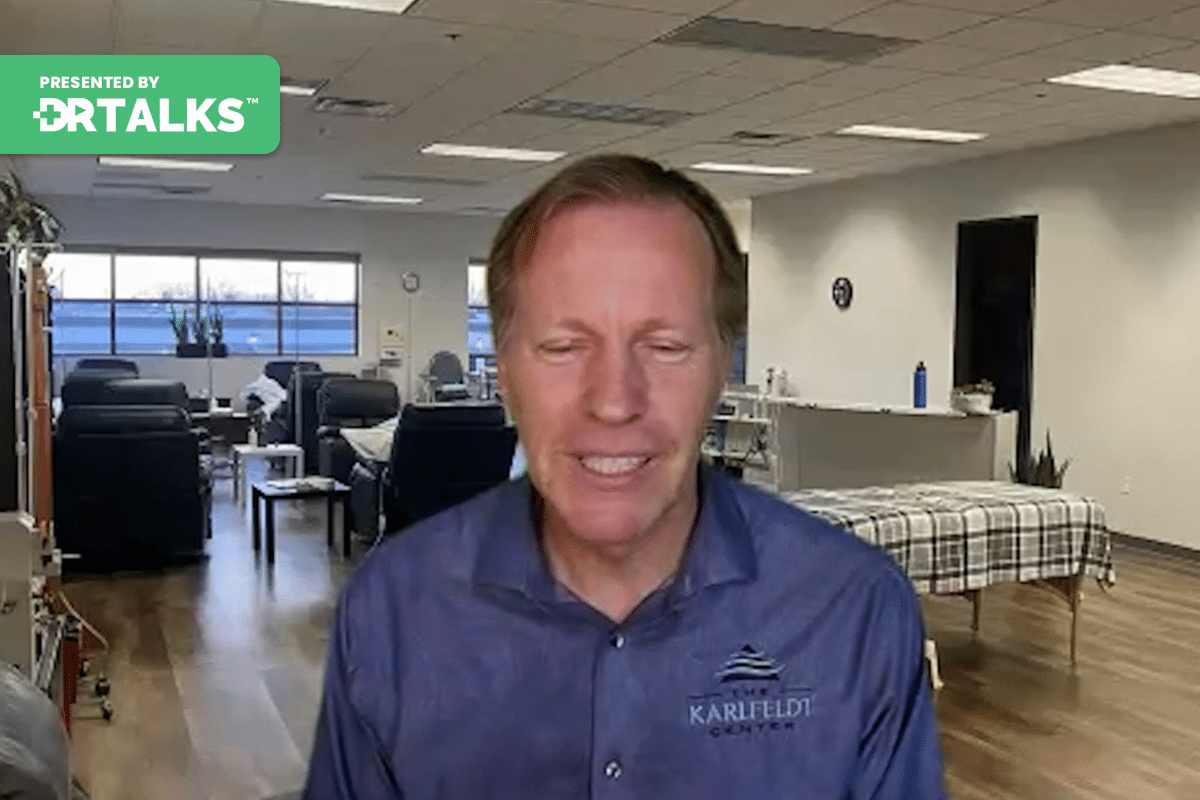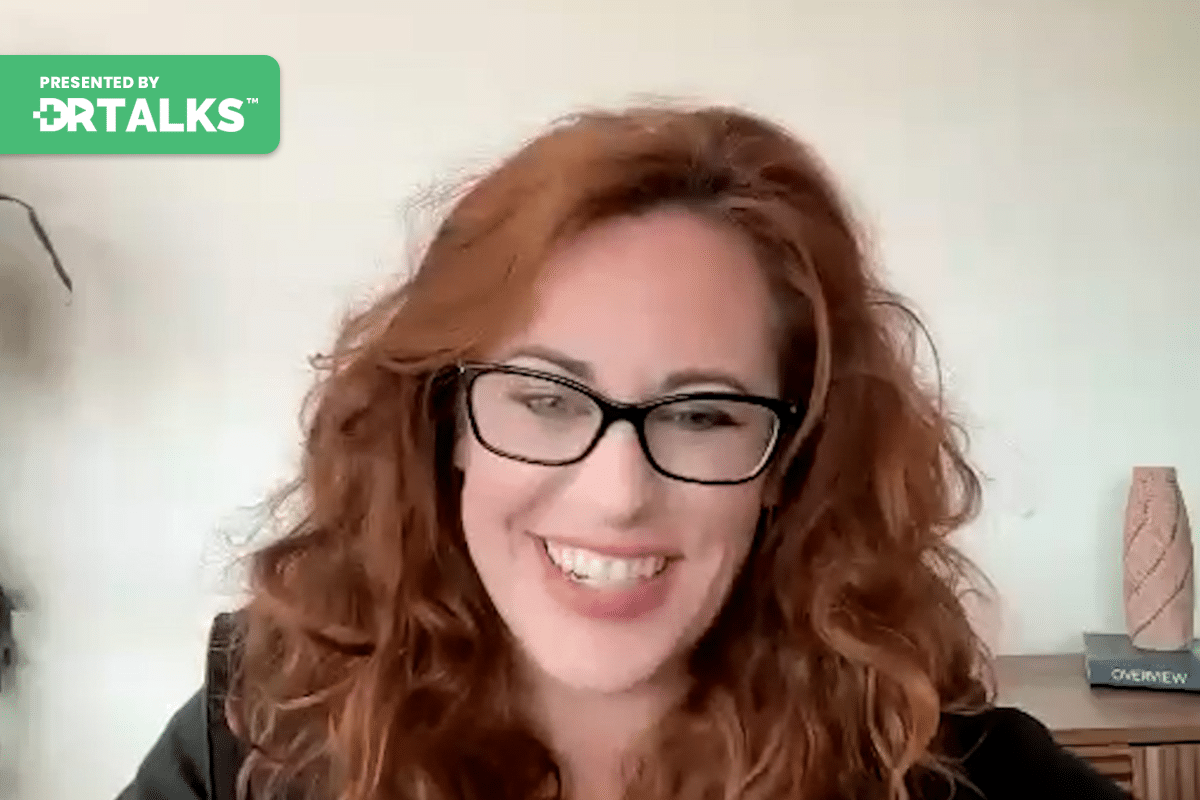Join the discussion below

Beverly Yates, ND is a licensed Doctor of Naturopathic Medicine, who used her background in MIT Electrical Engineering and work as a Systems Engineer to create the Yates Protocol, an effective program for people who have diabetes to live the life they love. Dr. Yates is on a mission to... Read More

Dr. Sanda Moldovan is an internationally recognized speaker, award-winning periodontist, author, and consultant on oral health, periodontics, nutrition, and anti-aging. Believing health issues that manifest in the mouth are key indicators for one’s overall health, she is a frequent speaker on periodontics and nutrition. She stays on top of the... Read More
- Understand the concept of biological dentistry and its relevance to diabetes
- Learn about gum disease and how it affects diabetics
- Discover practical steps to reverse bleeding gums at home, restore oral health, and address silent oral infections that can impact diabetes management
- This video is part of the Reversing Type 2 Diabetes Summit
Related Topics
Autoimmune Disease, Chronic Illness, Diabetes, Gum Disease, Heart Disease, Immune System, Infections, Inflammation, Microbiome, Oral HealthBeverly Yates, ND
Hi, everyone. Welcome to this session of the Reversing Type 2 Diabetes Summit. I’m your host, Dr. Beverly Yates, ND. It is my distinct honor and joy to be able to interview colleague Dr. Sanda Moldovan. She is a wonderful, holistic biological dentist who really focuses on that whole aspect of dental care and how it helps us all to live a healthier life. And in her work, she’s an internationally recognized speaker and award winning periodontist and author and consultant on oral health, periodontitis, nutrition and anti-aging. She believes that health issues that manifest in our mouths are key indicators for one’s overall health. And as such, she is a frequent speaker on periodontitis and nutrition. She stays on top of the latest research and technology in her field of expertise, in particular lasers, natural healing and minimally invasive techniques in dental implant surgery, periodontal plastic surgery and nutritional support. She has a book called Heal Up Seven Ways to Faster Healing and Optimal Health, and her podcast, The Holistic Dentistry Show, discusses how oral affects overall health and offers tips on maintaining a healthy mouth naturally. All right, Dr. Sanda Moldovan, welcome to our summit.
Dr. Sanda Moldovan
Thank you so much. Dr. Beverly, I am so excited to be here and talk about oral health with you.
Beverly Yates, ND
Great. So we know that there’s connections, you and I, but maybe not everyone understands how deep the connections are between diabetes and oral health, right? Like, what is the link between oral infections and gum diseases for diabetics? So but let’s first start a little earlier in this to get people to understand the bigger picture of this puzzle. So how is biological dentistry different than traditional dentistry?
Dr. Sanda Moldovan
Okay, that’s a great question because I think a lot of people still haven’t heard of biological dentistry and myself included. When I went to my residency at UCLA in 2001 to 2004, I was a traditional periodontist, so we were looking mostly at the mouth. But even back then we knew diabetes was associated with oral health issues. But biological dentistry really helps me focus on nontoxic treatments versus traditional dentistry, which actually can use a lot of toxic products still. And really the role of biological dentistry is to detoxify the mouth for a healthier body.
Beverly Yates, ND
All right, great. So then now let me understand a little bit about that background and the perspective that you’re bringing to this session. Please tell us why it is that this matters, which is, why are bleeding gums a problem even though most people ignore them? And I know this from my work with people, whether they have diabetes or not, if people’s gums are bleeding, they often don’t take that very seriously.
Dr. Sanda Moldovan
Yeah, you’re absolutely right. But, you know, if actually our palm was bleeding, people will rush to the doctor and say, Oh my God, why is my hand bleeding like gums are okay somehow? But the problem is, you know, the oral microbiome or the level of biofilm that we have in the mouth any time gums bleed, there’s an opportunity for bacteria to enter the bloodstream and travel down our blood vessel. And our immune system is not perfect. That’s the problem. You know, sometimes these microorganisms, such as something called poor pheromone gingivalis, which causes peripheral issues in people, is a stealth microorganism, so it can hide itself from the immune system. So the key is if we can stop the gums from bleeding, we really protect the body from dealing with these invaders. That’s the best way to put it.
Beverly Yates, ND
That makes sense then. So it sounds like what you’re saying is we’re not overwhelming the immune system from an organism that can cause a problem elsewhere and perhaps as an organism that might be good at hiding from the immune system. Is that fair to say?
Dr. Sanda Moldovan
That’s exactly right. And, you know, we know so much more today about the behavior of certain bacteria that cause periodontal disease, for example. Some of them are involved in like brain health. We know that they cross the blood brain barrier. Some of them are involved in joint pain, increasing the level of inflammation and actually causing plaque on arteries. So there’s so many things that we know about bacteria today so we can more target the treatment.
Beverly Yates, ND
That’s important. I think sometimes people have a perception that they go to the dentist that there might not be necessarily a focused treatment. But my experience with dentists is that it’s very focused. So I’m glad that you brought that up.
Dr. Sanda Moldovan
Yeah, absolutely.
Beverly Yates, ND
All right. So then in dealing with gum disease, bleeding gums, other issues that go on many people’s gums and affect their oral cavity, how does that affect healing from diabetes?
Dr. Sanda Moldovan
So what we know from all the research that’s been done and we have quite extensive research between diabetes and gum disease and what we do know is that people that have uncontrolled diabetes have higher level of gum disease. And what’s interesting is that when we treat the gum disease, the diabetes markers get better and you’re able to control it better because gum disease is an infection. And, you know, you can try to control their diabetes, but if you have an uncontrolled infection, that is not going to be good for healing.
Beverly Yates, ND
Make sense, right? It takes energy to heal. And so anything that’s compromising is not going to help with blood sugar control.
Dr. Sanda Moldovan
Okay, great.
Beverly Yates, ND
Yeah, We’re trying to piece it together and make sure people are clear about this. All right. So let’s expand our view of this a bit. What are some other oral infections that can prevent or interfere with reversing Type 2 diabetes or pre-diabetes?
Dr. Sanda Moldovan
There’s a lot of silent infections, which unfortunately can happen in the mouth, too. Like, for example, let’s say somebody has a root canal with a big cyst around it. A root canal is a dead tooth, essentially, that doesn’t give you a sensation. So even though there’s a big cyst, a lot of bacteria around it, people don’t feel it. And that’s a problem. That’s why in biological dentistry, we highly encourage people that have a root canal to get a cone beam CT scan so we can actually see if these root canal teeth are infected or not, because it’s not something that will trigger a signal and very, very important to treat these infections. As for the same reason these bacteria can get into the bloodstream, we see higher inflammatory markers and it can really affect the way you can treat diabetes then.
Beverly Yates, ND
Okay, so these infections being silent, are there any symptoms, anything someone might experience that would give them a clue that something’s going on? Because I’m imagining some people are not getting the imaging that would reveal this?
Dr. Sanda Moldovan
Yes, you’re right. So some symptoms that I have patients come in with is like, you know, my sinus on the right side or left side is bothering me. And it’s kind of strange. Usually a unilateral sinus drainage, especially for the upper maxillary molars that might have a root canal that could be a problem. Some people actually can say, you know what, I constantly feel some kind of drainage in the back of my throat or I feel a lymph node, you know, underneath the chin that might be a little bit tender. So that could be definitely a sign that a root canal has gone bad or a little boy or, you know, a little gum swelling at the level of the tooth. So I do recommend for people to actually do like a quick oral examine the mirror, you know, just kind of look at the guns, you know, look in the back. Do you see anything swelling my gums, bleeding. Do you see brown spots on your teeth? It’s important to just do a little self-exam.
Beverly Yates, ND
Right? That’s really I think that’s accessible to anyone listening. You know, for the audience that we have for Summit, it’s usually a mixture of people. It’s going to be the general public primarily, but there’s also a strong cohort of people who watch the summit who are health and medical professionals. So I think we can help people both for their own mouths as well as those of us who are in clinical roles to be advocates for people have better oral care and awareness and to understand the connection on these pieces. People with diabetes often don’t get, in my opinion, really good quality information. So I appreciate you sharing these details.
Dr. Sanda Moldovan
Absolutely. Beverly. And another thing I want to mention is that, you know, if people have a broken tooth and they say, oh, it doesn’t bother me, but it’s clearly broken at the gum line and oftentimes this could be a root canal. Treat a tooth and people oftentimes just leave that alone because it’s not bothersome. But that’s the wrong thing to do, because a broken tooth, if left open, is basically a direct pathway to the bone and that bacteria from the mouth will find its way down into the jawbone and create something called a cavitation or basically also like a cyst in the bone that’s filled with bacteria.
Beverly Yates, ND
Okay, Good to know. Good to know. These things really do have their preceding steps that have led to the problem or in this case, you know, the root cause issues. Right. Something got there was something happened and now they’ve got a deeper problem, but they’re unaware of the entry point. What got this thing first started? Okay. Okay. So what can people do at home to prevent bleeding gums and gum disease?
Dr. Sanda Moldovan
That’s a great question and I’m happy to talk about this because it’s really starts at home. Even if somebody goes to the dentist like monthly, it’s not enough. Really. We need to take health into our own hand and especially oral health and really follow three simple steps to reduce bleeding gums. And these are scientifically proven to decrease inflammation and bleeding. Number one, of course, is brushing and twice a day is important. And, you know, it really doesn’t matter if you have an electric brush or you have a manual brush, it really doesn’t matter because sometimes I find patients have the fanciest electric brushes, but lots of plaque on their teeth because they’re missing the gum line. So the important thing is when you’re picking up a manual brush is to actually brush and small circles to hit the gum line and kind of sweep the plaque from underneath the gum. You don’t want to brush your gums, but you want to brush from underneath the gum. So brushing is important. Second step is water flossing. And more and more research is coming out on water flossing to show that it decreases inflammation so much more than string floss. Studies show even up to 30% in teeth. But for those of you out there who have dental implants, up to 80% reduction in bleeding when you’re using a water flosser versus string floss. So that’s big numbers for us. And the last step is really for those of you that build a lot of plaque in your diet and diabetics, we actually see drier mouths. So in dry mouth there’s more plaque buildup. So I recommend trouble probiotic because chewable probiotics with xylitol have been shown to reduce the amount of plaque that gathers on the teeth and also reduce the rate of cavities. So those three steps anybody can do at home and I say it’s really the best prevention for, you know, pain and, you know, financial burden at the dental office.
Beverly Yates, ND
That’s great. Wonderful tips. Thank you for that. Since you mentioned issues with the dry mouth and in fact, with people with diabetes, are more likely to have a dry mouth and therefore have the earlier stages of the setup for plaque. I’m wondering if we could just take a moment to talk about an autoimmune illness that also leads to a dry mouth, part of what’s called Sjögren’s syndrome, where the person’s dry mouth right nose, dry eyes. And in that case, cause there’s bound to be some people watching who are like, Well, how about Shoguns? Right? So any special tips or insights for people who have that autoimmune disease known as Shoguns syndrome, where they have that trial really of the dry ice, dry nose, dry mouth in this case for their oral care, are there things they can do? May actually it might help them produce more saliva and decrease the issues with a dry mouth.
Dr. Sanda Moldovan
Yeah. So for patients with autoimmune and actually I’m seeing quite a few patients with autoimmune with showgrounds that basically the mouth is so dry sometimes that the lips are sticking to the teeth. It’s very important to keep the teeth mineralized. And yes, I think having a lozenge with xylitol of course sugar free. Okay, make sure it’s sugar free because otherwise you’ll get cavities, it’s to stimulate the saliva. But the important part is to really keep the teeth mineralized because one of the roles of saliva is to maintain the teeth mineralized. So when we don’t have saliva, what are we seeing? People with chronic dry mouth such as showgrounds is a breakdown of that enamel. So people start to chip away the teeth and they all of a sudden they become sensitive to me is a sign that the teeth have been mineralized. So a great solution for home is actually using a tooth powder with like calcium hydroxyapatite for example, or nano calcium, or you might find even toothpaste at your natural grocers that uses calcium hydroxyapatite just to help to bring the mineral back into the teeth because you want to avoid cavities. That’s a main thing that we see with people with Sjögren’s it great.
Beverly Yates, ND
Thank you for clarifying about that. Okay, so are there any other concerns or myths that we need to myth bust here when talking about oral care for people who have Type 2 diabetes or pre-diabetes?
Dr. Sanda Moldovan
Well, some myth busting is like, Oh, you know, I hear patients, my gums have bled all my life. There’s nothing we can do about it. That’s not true.
Beverly Yates, ND
I’m not normal. It might be typical for someone, but it’s not normal.
Dr. Sanda Moldovan
Yeah, definitely. Or thinking, you know, I don’t really need to floss because my brush is getting everything and I swish water. I’ve heard this one. I take water in my mouth, I swish it back and forth and between my teeth and I don’t need to floss. No, I that’s not really getting, you know, they in between which, which is where periodontal disease starts, it really starts in between the teeth. It doesn’t start really on the outer surfaces. And mostly why is because people hate to floss. So I think if you were to choose one thing you know, most people choose, I’m just going to brush my teeth. But I actually say choose to water floss your teeth, not brush, because that’s even more important so than actual brushing.
Beverly Yates, ND
Okay, Good to know. Good to know. It’s always interesting to me when people fight back, I won’t do the basics to care for themselves. And then when they get in trouble, they think it came out of nowhere when actually. No.
Dr. Sanda Moldovan
Yeah, exactly.
Beverly Yates, ND
All right. You know, there’s a lot of people who are stressed in today’s world, you know, hearing cortisol nation or around the world. Cortisol world. Right? People are just stressed and pushed and are feeling at their limits. And some people have issues with grinding their teeth. Some people also have sleep apnea. You know, it’s one of the things we’ll be talking about sleep as sleep disorders, this sleep hygiene here on the summit. So we talk about dental care. Can you give us some insights on teeth grinding and protecting our teeth and bruxism and all that goes with that?
Dr. Sanda Moldovan
So many people, especially in the last three years, have been coming in with TMJ problems and grinding and clenching because there’s more stress in the world. So one of the things that becomes important is how do we protect our jaw, how do we protect our TMJ and our teeth? So number one thing is, of course, to go to the root of the problem and really try to find ways to meditate at night or maybe, you know, start with like calming down the mind that to help reduce that clenching. Secondly, we highly recommend night guards because I think that’s the best insurance policy against cracking teeth. At least if you’re cracking the night guard, you’re not going to crack the tooth. That’s important. And for people, you know, with sleep apnea, which is so important because studies show that people with sleep apnea have a 47% morbidity rate, which is high. We also recommend definitely get a sleep study and make sure we get the right guard for you, because sometimes night guards can actually interfere with sleep and can make us sleep apnea patient worse. So it’s important to, you know, even in dentistry to diagnose the right, you know, if the patient might be a sleep apnea patient through the questionnaire that we have just to make sure that we set them up for a good sleep and for clenching and grinding. And interestingly enough, sleep apnea comes hand in hand with clenching and grinding because it creates that stress of the lack of oxygen.
Beverly Yates, ND
It makes sense. Right. And I know when people are listening, if they’re recognizing themselves, I hope that, you know, friends as you listen, that you’re not feeling overwhelmed. We just want you to be able to peel back the layers of the onion so you can take care of yourself and understand there’s all these different avenues that affect your health and affect your outcomes. And if you’re having problems with your blood sugar, it’s multiple factors multifactorial, and we’re being thorough in how we approach things on the summit. Okay, So with sleep apnea, sleep disorder is clenching, grinding the oral cavity and its own microbiome. It is important, for instance, that people really take a time to chew their food. I know what your answer was going to be, but I’d love if you would share with people why you have the answer to share.
Dr. Sanda Moldovan
Yeah, absolutely. So it’s important to chew your food till becomes like really liquefied because digestion starts in the mouth. But I know I’ve done this myself, you know, especially when I was a resident. I was always under on eating my food in 5 minutes. And you know how it goes. It’s like, next thing you know, I haven’t chewed my food, but it’s very, very important to actually chewing the food properly actually will stimulate the saliva. And also especially for people we’re talking about dry mouth, I think really chewing your food enough also helps to stimulate the saliva. And one of the things that will happen again as we’re using, you know, is we have a good fibrous diet. We will start to see more aware of the enamel. And I see that in myself. My two front teeth are starting to wear down because I do have a fibrous diet. So again, the number one more important thing is to keep the enamel strong is to your diet. So have good minerals such as calcium, magnesium, boron, phosphorus in the diet that’ll keep the teeth strong from within. It’s not just the topical things that we put on the outside, but it’s really what we take on the inside that keeps our teeth and bone strong because teeth are bone. Actually it’s the same, the same content.
Beverly Yates, ND
That’s a great distinction. Thank you for bringing that forward. I always want to make sure that, you know, people have got quality information that’s factual. In a lot of times My experience has been clinically that they have so much confusion.
Dr. Sanda Moldovan
Yes.
Beverly Yates, ND
Yes. All right. Very true call. Are there anything that people should watch out for? Like, for instance, if they drink or eat something that’s acidic, whether it’s lemon water or it is, heaven forbid, I hope it’s not soda, but whatever things that are. Yes. Should they be concerned about acidic beverages, coffee, tea, things like that?
Dr. Sanda Moldovan
Yeah. So for the teeth, you mean, or how it.
Beverly Yates, ND
Affects their teeth?
Dr. Sanda Moldovan
Yeah. So, you know, I’m always a proponent of checking the PH in the saliva. That’s number one. And things such as like colas and sugar will make the saliva more acidic. And you know, the mouth I always say is the gateway to one’s health. And it tells me a lot when I look in someone’s mouth. So if somebody is eating sugary things like Coca Cola, things like that, and when I test the saliva and I actually have strips and I recommend everybody can do this at home, you can get the paper strips, pull a little bit of saliva, the tip of the tongue, just swipe the paper and see where you’re at. And typically we you know, we want the PH to be somewhere in a neutral phase around seven. But what we find, especially with stress and people who have diabetes, which have a lot of oxidative stress, they tend to be more acidic. So what does that mean? When saliva becomes more acidic, you will affect the teeth more and dissolve the enamel just like, you know, if you put a tooth in a Coca Cola liquid actually will dissolve the tooth because of the acidity of it. So it’s the same so we can take care of our bodies and eat more dark, leafy greens because it will also help the teeth. You know, those minerals from the dark leafy greens will make you more alkaline and in turn your saliva more alkaline and protect your teeth and your oral cavity from where.
Beverly Yates, ND
That makes sense. Eating foods that are nutrient dense and mineral rich is always going to be the way to go, right, For human health?
Dr. Sanda Moldovan
Yes, absolutely. But to answer your question, what do you avoid? Lemons, right. Lemons, limes, oranges, grapefruits, great for health. And they’re alkaline forming in the body. However, they can be really bad for teeth. I have patients that actually have, you know, a sucking on lemons. Their enamel is completely gone off the front teeth. So even though lemons, limes, oranges are great food, do not put them in contact with enamel for long periods of time because it will dissolve your tooth. I’ve seen some patients with basically half the tooth gone from the acid of the lemon, so that can be bad. So my recommendation is let’s say you’re having some lemon tea, just rinse your mouth. After you can use alkaline water, you can use a neutral water just to rinse your mouth so the acid doesn’t stay on the tooth you don’t want to brush. Okay. This is very important. If you’re going to eat a lemon or an orange or let’s say drink red wine or white wine, which is also has a page of around three, don’t brush right away. Wait at least 30 minutes to brush, but you can rinse your mouth just to kind of balance off that acidity. Because if you start brushing your teeth right after you put acid on your teeth, it’s going to wear off the enamel again. So, yeah.
Beverly Yates, ND
That’s a great insider tip. Thank you for making that one really clear. I’ll bet everybody learned something there. I hope both are taking notes here.
Dr. Sanda Moldovan
Great.
Beverly Yates, ND
Okay. So as we talk about dental care here, before we wrap up, I want to ask you your thoughts about what goes on for people with dental care who maybe have a family history of gum disease, like, say, gingivitis, other things like that, where they’ll say, oh, but my mom had a problem, my grandfather had a problem, my aunts, my uncles, like whatever. What is the story with any genetic tendency towards this problem?
Dr. Sanda Moldovan
That’s a great question, Beverly, because now we treat periodontal disease differently, so we do more personalized treatment. So if somebody walks in with periodontal disease in my office, first thing I like to do is take a saliva sample, send it to the lab, because I want to see, number one, what kind of bacteria is causing the disease. Is it the aggressive type or the mild type? And the other thing that we’re measuring is that genetic predisposition to bone loss in measuring the IL six genetic marker. So if people have a high genetic propensity towards bone loss, we put them on a much shorter, much more frequency of cleanings than somebody who doesn’t have a genetic predisposition. So in the past, you know, even when I was a resident, we treated everyone the same. Everybody gets the cleanings and everybody had periodontal surgery. But now we don’t do it that way. I rarely have to do periodontal surgery because we can treat everything non surgically, which is the nice thing. So for those of you that are scared to go to the dentist with gum disease, don’t be because things have changed a lot and we can do a lot of things to save your teeth. Don’t wait till it’s too late, for example, that if the teeth become loose, it’s already a bit too late. If you see your gums bleeding, that’s when you should be proactive, because the smaller the problem, the easiest it is to treat always.
Beverly Yates, ND
That makes total sense. So how about the case where there’s rescission, where the gum line is receding, let’s say, from somebody grinding their teeth? You know, there’s wear and tear. Maybe they’ve got on a mouth brace, but or a teeth brace, rather, upper or lower. And the gum is responding and it’s receding at that point of pressure. What happens there?
Dr. Sanda Moldovan
Yeah. And the most common area actually, where we see gum recession is actually right on the premolar, right behind the teeth or the canines. That’s where we see the most recession typically because the gum gets thinner. And as a periodontist, about 40% of what I do is street gum recession. So we treated it in many different ways. But to prevent gum recession, definitely don’t brush too hard. That’s a very, very important. The second thing, in order to treat it, what I like to do nowadays is draw blood and use PR for platelet rich fibrin to inject it under the gum, to help to thicken it. If the gum gets too reseeded. Now, the bigger the problem, the more intense it is to treat. We have to collect oftentimes gum tissue from somewhere else and kind of move it to the side in order. It’s called a gum graft in order to thicken that gum area. Because what’s the problem with recession? Whenever a gum or exceeds the bone behind it also recedes and then the tooth can potentially get loose. So if you actually see that you got gum recession, it’s always better to consult a periodontist sooner rather than later. And they might say, you know, you don’t need anything. Like, for example, if you only have a millimeter to a recession, typically we just monitor that we don’t do treatment, but three millimeters or more than we go into treatment to try to preserve the bone. That’s the key.
Beverly Yates, ND
Great. Thank you for a clear answer to that. And it’s unique because I’ve not heard people talk about platelet rich treatments for this specifically. So it’s good to know that that’s another option. When someone is trying to preserve their tissue in functionality for as long as possible.
Dr. Sanda Moldovan
Yes, absolutely. That’s the important thing. As we live longer, we want to maintain and keep our teeth longer. And I do have a lot of my patients that are in their nineties with all their teeth because believe it or not, I have some patients that come in and say, Well, I know I’m going to lose my teeth. It’s just a natural process of aging. Absolutely not. No, we are meant to actually have our teeth for the rest of our life. And with the techniques we have today and with the homecare care we can have today, it’s really, really easy. I say, to maintain our teeth long term.
Beverly Yates, ND
Beautiful. I totally agree with you about that. Live long, live well and preserve as much as you can.
Dr. Sanda Moldovan
Yes, absolutely.
Beverly Yates, ND
All right. So, Sanda, where can people connect with you? Where can they find out more information if they would like to follow up?
Dr. Sanda Moldovan
So I recently started a podcast, the Holistic Dentistry Show, in which I talk about other holistic dentistry topics, and I welcome your questions. And if you have any ideas about what you’d like to hear, please go to Instagram @DrSanda, or you can go to BeverlyHillsDentalHealth.com and find out more about biological dentistry.
Beverly Yates, ND
All right, great. Thank you so much for being an interviewee here on our summit. I appreciate your professional background and the point of view that you bring to the world of care and how we can help people who have Type 2 diabetes, pre-diabetes, any kind of blood sugar dysregulation have a healthier, happier life. Thank you so much for your work.
Dr. Sanda Moldovan
My pleasure. Dr. Beverly.
Downloads










